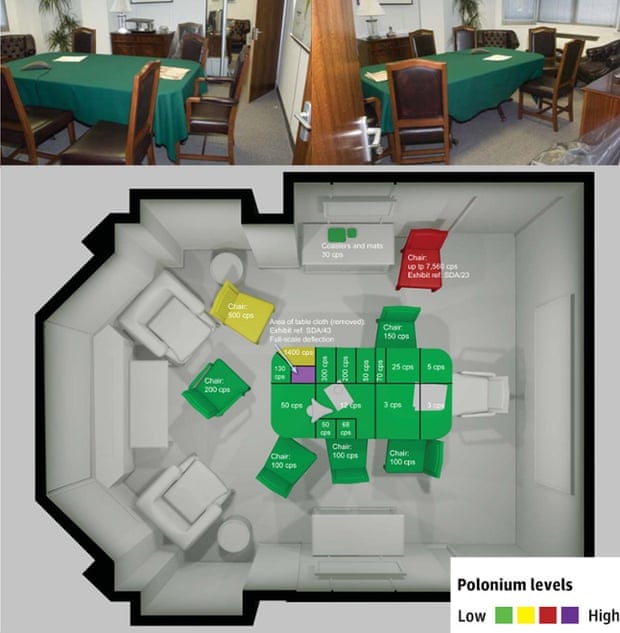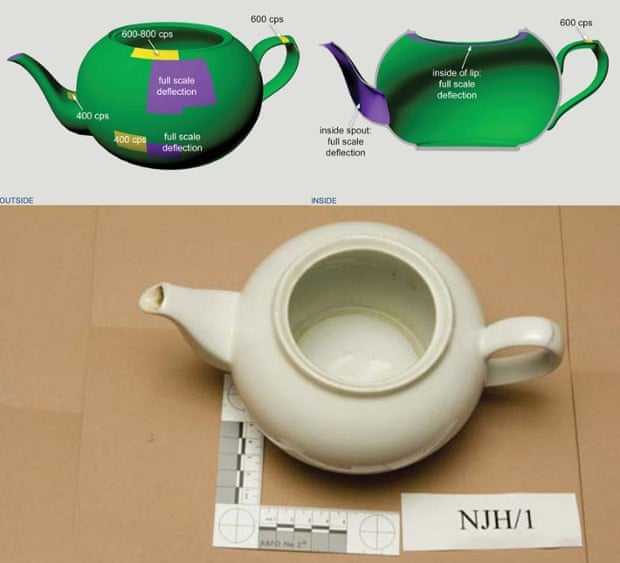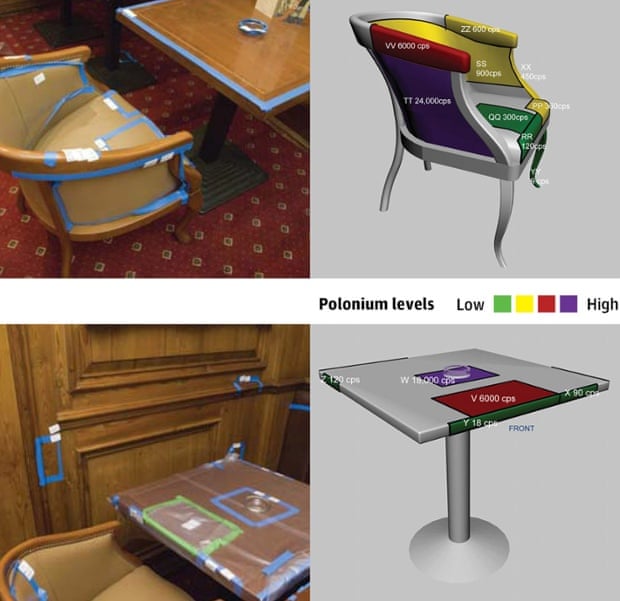Putin had underworld connections when he worked in 'the criminal capital of Russia' says widow of poisoned spy LitvinenkoMarina Litvinenko is giving evidence to inquiry into husband's death today
Says she hasn't spoken to father-in-law Walter since he went on Russian TV to denounce his son two years ago
Alexander Litvinenko allegedly worked for MI6 after fleeing home country
Fell out with Vladimir Putin over bid to assassinate Boris Berezovsky
Litvinenko claimed Putin was involved in 'criminal conduct' and predicted he would be killed after exposing the plot
Arrived in UK saying 'I'm a KGB officer and I'm asking for political asylum'
He died in November 2006 after drinking tea poisoned with polonium
Thousands of Londoners were in danger from radiation, inquiry was told
By ARTHUR MARTIN and HUGO GYE FOR MAILONLINE
PUBLISHED: 07:52 EST, 2 February 2015 | UPDATED: 11:22 EST, 2 February 2015
The widow of poisoned spy Alexander Litvinenko today accused Vladimir Putin of being linked to criminal groups in his home city of St Petersburg.
Marina Litvinenko told a public inquiry that her husband, known as Sasha, looked down on the future president of Russia when he became head of the country's secret service.
She added: 'On his position of deputy mayor of St Petersburg, Sasha believed he was involved in some criminal conduct'.
Mrs Litvinenko said she did not know the details of Mr Putin's alleged criminal connections, but at that time St Petersburg was known as 'the criminal capital of Russia'.
Accusation: The spy's widow Marina, left, said that Russian president Vladimir Putin, right, was involved in criminality while he was deputy mayor of St Petersburg
The inquiry also heard that Mr Litvinenko's father Walter went on Russian TV two years ago and called his son a 'big traitor' for working for MI6, leading to Mrs Litvinenko cutting all ties with her father-in-law.
The 52-year-old widow said: 'Two years ago he said that he didn't know that Sasha worked for MI6 and because of this he thinks he is a big traitor. And everything he said before was wrong.'
Giving evidence at the Royal Courts of Justice in London, Mrs Litvinenko added that she had not spoken to her father-in-law since his televised outburst.
Mr Litvinenko died aged 43 in November 2006, three weeks after drinking tea laced with radioactive polonium while meeting two Russian men at the Millennium Hotel in London's Grosvenor Square.
Last week, the long-awaited public inquiry into his death heard that thousands of Londoners were exposed to the risk of radiation poisoning, while Mrs Litvinenko's lawyer accused 'common criminal' Mr Putin of being responsible for his murder.
Former KGB bodyguard Andrei Lugovoi and Dmitri Kovtun have been identified as the prime suspects in the killing, but both deny any involvement and remain in Russia.
Litvinenko's widow: Public inquiry 'very important to me'
Speaking with an interpreter by her side today, Mrs Litvinenko described how her husband was a loyal member of the Russian secret service, the FSB, before he became disillusioned with the regime.
She added that he was ordered to kill tycoon Boris Berezovsky, but instead befriended the businessman and tipped him off about the threat to his life.
Mr Berezovsky had made enemies with senior security figures after becoming one of Russia's most prominent figures in both business and politics during the 1990s.
In 1994 he escaped an assassination attempt after a car blew up outside his office, killing his bodyguard.
The same year he was implicated in the murder of a popular television anchor, but Mr Litvinenko apparently intervened and prevented him being arrested.
'They could say he had a heart attack and then make it easier to blame Boris Berezovsky for this crime,' Mrs Litvinenko said. 'After that Boris Berezovsky said many times that Sasha had saved his life and he was very grateful.'
Mrs Litvinenko said that her husband was asked by a senior FSB officer in December 1997 if he could kill the businessman, who had angered the army and security services by helping to negotiate an end to the First Chechen War.
'Sasha decided to talk about this with Berezovsky, because he was a very high profile figure,' Mrs Litvinenko told the hearing.
'I believe it was a question: "Could you, for example, kill Berezovsky?" Sasha was worried what the [anti-terrorism] unit might then be asked to do. After a few months he decided to tell this to Berezovsky.'
Mr Litvinenko also refused commands to confiscate the ID documents of another FSB officer, and to kidnap a Chechen businessman, the inquiry was told.
Several members of his FSB unit were suspended after complaining about the plot to kill Mr Berezovsky and accusing senior officers of corruption, Mrs Litvinenko said.
Mr Litvinenko went to see Mr Putin in 1998, shortly after the future president had been appointed as head of the FSB.
+11
+11
Dissident: Mr Litvinenko, left, turned against the Russian secret service which employed him after bosses ordered him to kill Boris Berezovsky, right
But the meeting was 'unproductive,' according to Mrs Litvinenko, who explained: 'This meeting was arranged by Berezovsky and Sasha, who was suspended, to discuss corruption in the FSB.
'The idea was that this meeting with a new director would make a change to the situation.
'Sasha said it was not a productive meeting, and he believed there was not a chance of change. He didn't believe that Putin could make any change in his position as director.
Could you, for example, kill Berezovsky?
FSB officer to Alexander Litvinenko
'Sasha didn't believe in Putin's professional skills. He told me that from the very beginning when he was director he had never been on the ground.
'Putin had finished university and spent a lot of time in the German Democratic Republic and didn't really understand his job - like Sasha did from fighting against organised crime.'
Mr Litvinenko was later jailed after holding a press conference to denounce Mr Putin and fled from Russia in 2000, settling in London where he became one of the president's most outspoken critics.
His widow said today that he had predicted that 'they will kill him or he will be arrested' after the televised conference.
His friend Mr Berezovsky also moved to the UK, but after he was left penniless following a legal battle with Chelsea owner Roman Abramovich he was found dead in an apparent suicide at his Berkshire mansion two years ago.
Suspects: Dmitri Kovtun, left, and Andrei Lugovoi, right, have been accused of murdering the Russian spy
+11
Suspects: Dmitri Kovtun, left, and Andrei Lugovoi, right, have been accused of murdering the Russian spy
LITVINENKO MET HIS WIFE MARINA WHEN HE WAS ALREADY MARRIED
Marina Litvinenko met her future husband Alexander in June 1993 - when he was still married to his first wife.
She told the inquiry that she found the policeman 'very friendly', and they wed the next year after he split from his wife following a string of rows.
Mrs Litvinenko described how she was trained as an engineer but became a professional dancer and married her dance partner.
She first met Alexander after her marriage fell apart, and asked him to help with a contract dispute she was involved in.
'At the time he was not single, he was married,' she told the inquiry. 'He introduced himself as a married man who had two children and he said, "My children are the most important thing to me."'
When Mr Litvinenko began spending increasing amounts of time on the case it led to tensions between him and his wife, and before long they separated.
'After that we got closer,' Mrs Litvenenko said today. The couple were married in October 1994.
Mr Litvineko is said to have worked with both MI6 and the Spanish secret service, passing them information about alleged links between Mr Putin and Russian criminal gangs.
His widow and supporters have accused the Russian government of being responsible for his death - last week Mrs Litvinenko's lawyer described Mr Putin as presiding over a 'mafia state'.
The inquiry was also told that the post-mortem examination on Mr Litvinenko was 'one of the most dangerous ever undertaken in the western world'.
Home Office forensic pathologist Dr Nathaniel Cary said Mr Litvinenko's radioactive body was 'very hazardous' and had to be transferred to a secure site for tests.
The public inquiry opened more than six years after his death, following a sustained campaign by Mrs Litvinenko.
The inquiry panel, chaired by Sir Robert Owen, will be able to consider secret evidence, but it will not be disclosed to the lawyers or witnesses.
Lugovoi and Kovtun have refused to give evidence to the inquiry - Lugovoi, now a Russian MP, claims that the whole procedure is politically motivated.
The hearing continues.
'I'm a KGB officer and I want asylum': How spy fled across Europe and sought refuge in the UK
Alexander Litvinenko landed at Heathrow airport and told a police officer: ‘I’m a KGB officer and I’m asking for political asylum’, the inquiry heard.
The agent arrived in Britain with his wife and son after fleeing across Europe on fake documents to escape Russian spies who were following them, it was said.
His widow Marina told the public inquiry into her husband’s death how they fled in 2000 after Russian agents threatened to kill her and their son Anatoly.
Refugees: The Litvinenkos and their son Anatoly, now 20, travelled across Europe to reach Britain in 2000
+11
Refugees: The Litvinenkos and their son Anatoly, now 20, travelled across Europe to reach Britain in 2000
Litvinenko, known as Sasha, became a ‘marked man’ in Russia after he held a press conference in 1998 claiming that the Kremlin had plotted to kill oligarch Boris Berezovsky.
Fearing for his life, he sent his wife and son to Spain while he slipped out of Russia through Georgia on a fake passport.
He then met his family in Turkey, but every day they had to move to a different town or city because they thought Russian agents were on their tail, the court heard.
They tried to claim asylum in at the American embassy in Turkey. When they were refused, they boarded a plane to London where they were granted political asylum.
Mrs Litvinenko said: ‘Sasha said if [the Russians] arrested me I would never be able to leave prison. They would kill me.
‘It means I had to decide if I want to save my family or if I was to make my own way back to Russia.
‘My life and the life of my son was in danger. He said: “They will put you in prison and I will not be able to protect you”.
He flew an English flag from the balcony during the football World Cup
Alexander Litvinenko's widow Marina
‘Sasha was told that me and our son Anatoly might be killed or [held] responsible for what he did.’
Mrs Litvinenko told the Royal Courts of Justice how they were always worried about their safety while in Turkey because they thought the Turkish authorities were tipping off the Kremlin.
When asked about their arrival in London, she said: ‘Sasha went to the first police officer and said: “I’m a KGB officer and I’m asking for political asylum.”’
In 2006, Mr and Mrs Litvinenko and their son Anatoly were granted British citizenship, the inquiry heard.
'He was very proud to be British, he did kept an English flag on his balcony during the football World Cup in 2006 and he was very proud for his son to be British and having his future in England,' she said.
The hearing was told that Boris Berezovsky paid for the family's home in north London, as well as school fees for Anatoly, who was a pupil at City of London School and is now studying at University College London.





